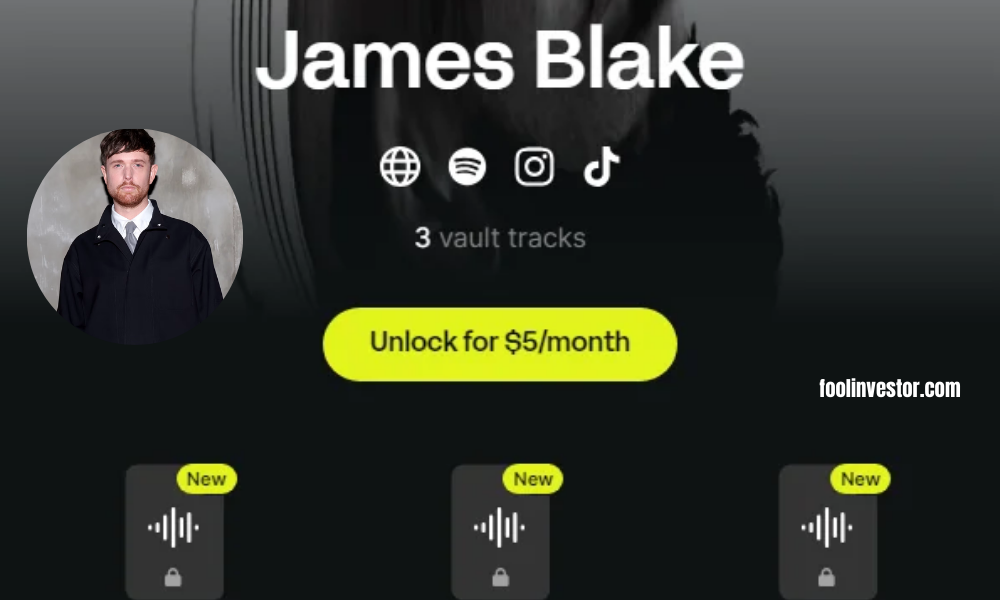James Blake, a Grammy-winning artist known for his contributions to music, has openly criticized the current streaming royalty structures, expressing concerns for fair compensation in the industry. This agitation led him to partner with Subscription Service Vault, envisaging a direct artist-to-fan connection that challenges traditional royalty payouts.
Vault, positioned as a revolutionary platform, offers a unique composition of services focused on unreleased music, ensuring artists retain control over their work. By exploring the impact of James Blake’s partnership with Vault, the article will delve into the potential transformations within the music industry, particularly in how artists like James Blake navigate streaming royalties and artist income.
James Blake’s Critique of Current Streaming Royalties
James Blake has been vocal about the inadequacies of the current streaming royalty systems, highlighting several critical issues that underscore the financial challenges faced by artists in the digital age.
- Streaming Royalty Rates:
- Artists earn between $0.003 and $0.005 per stream, varying by platform.
- A million streams translate to approximately $3,000, which dwindles significantly after label cuts, management fees, taxes, and recording costs.
- Artist Visibility and Earnings:
- Only 19% of artists on Spotify boast over a thousand listeners, spotlighting the difficulty of achieving financial sustainability through streaming alone.
- TikTok’s minimal payouts led to significant actions like Universal Music Group withdrawing its catalog from the platform.
- The Call for Sustainable Earnings:
- Blake’s critique extends to the broader impact of streaming platforms and social media on the music industry, including the push towards rapid production over quality due to financial pressures.
- He underscored the need for a fair compensation model, stating, “if we want quality music, somebody is going to have to pay for it,” to ensure artists can focus on their craft without financial strain.
Related – How Music Artists Earn Money ?
Vault: A New Paradigm for Artist-Fan Connection
Vault represents a significant shift in how artists connect with their fans, moving away from traditional streaming platforms to a more intimate, direct-to-consumer approach. Here’s how Vault is changing the game:
- Subscription Model:
- Fans pay a monthly fee of $5 to access exclusive, unreleased music from artists like James Blake.
- The majority of this fee goes directly to the artists, ensuring fair compensation.
- Direct Artist-Fan Interaction:
- A built-in chat section enhances the connection between artists and their fans, fostering a community around music.
- Artists have the freedom to release music on their terms, without delays or gatekeeping.
- Ownership and Data:
- Unlike traditional digital service providers (DSPs), Vault allows artists to own their data, giving them more control over their content.
- This model not only supports artists financially but also encourages them to focus on creating music rather than spending time on promotional activities on social media platforms.
Vault’s innovative approach, which includes features like music NFTs on the Solana blockchain and a Fantasy Record Label game, creates a new economy for independent musicians. By empowering artists to regain control over their music and earnings, Vault is setting a new standard for artist-fan connections, making it a promising alternative for those disillusioned with the current state of streaming royalties.
Impact on the Music Industry and Artist Income
James Blake’s partnership with Vault is poised to catalyze significant shifts in the music industry, particularly in how artists generate income from their creations. This initiative underscores a move towards more direct artist-fan economic interactions, diverging from traditional revenue models dominated by streaming platforms. Here’s a closer look at the potential impact:
- Direct Revenue Model:
- Artists receive a larger portion of subscription revenue, significantly higher than traditional streaming platforms.
- This model incentivizes musicians to focus on music creation, with the potential to reinvest in production costs.
- Challenges and Opportunities:
- Established artists with existing fan bases stand to benefit immediately from Vault’s subscription model.
- New artists may face hurdles in building a subscriber base, highlighting the need for effective marketing and community building strategies.
- Broader Industry Implications:
- Subscription services like Vault could shift the focus from quantity to quality, encouraging the release of music that resonates more authentically with audiences.
- This approach may also address the issue of unreleased tracks, providing a platform for artists to share their work without conforming to prevailing trends or commercial pressures.
In essence, Vault’s model not only offers an alternative income source for artists but also challenges the current paradigms of music consumption and artist compensation, potentially leading to a more equitable and artist-focused industry landscape.
James Blake’s Role and Future Implications
James Blake’s intimate and introspective james blake music has always set him apart in the industry, and his vision for Vault is no different. Blake seeks to revolutionize the way musicians earn, directly from their creations, to cover essential expenses like studio rentals and musician fees. This vision stems from his critique of the current streaming royalty structures, which he voiced through viral social media rants, leading to his partnership with Vault. Blake’s goals extend beyond financial gains; he aims to create a space where music that doesn’t conform to prevailing trends or requirements can thrive. This initiative has the potential to shift the industry’s focus towards a more artist-centric model, where the value of music is not dictated by its commercial success but by its artistic merit and connection with the audience.
End Lines
Through this exploration of James Blake’s partnership with Vault, the transformative possibilities for the music industry and its economic models have been highlighted, underscoring a shift towards more equitable artist compensation and direct fan engagement. This partnership not only challenges existing streaming royalty structures but also presents a compelling argument for a future where artists can thrive financially through closer connections with their audience. The emphasis on fair compensation, control over one’s work, and the fostering of a genuine community between artists and fans sets a new standard for how music could be shared and monetized in the digital age.
The broader implications of Vault’s model, as illuminated by James Blake’s initiative, suggest a promising horizon for the music industry, one where quality and authenticity could prevail over commercial pressures. It encourages a reevaluation of value in music—where the artistic merit and the creator’s direct relationship with their audience become central. As this innovative approach gains traction, it may inspire further developments and alternative models that prioritize the artist and the quality of their creations, potentially leading to a more artist-centric and financially sustainable future for the music industry.


